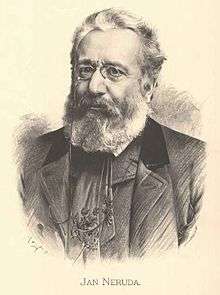Jan Neruda
| Jan Neruda | |
|---|---|
 Portrait of Jan Neruda by Jan Vilímek | |
| Born |
Jan Nepomuk Neruda 9 July 1834 Prague, Austrian Empire |
| Died |
22 August 1891 (aged 57) Prague, Austria-Hungary |
| Resting place | Vyšehrad Cemetery |
| Occupation | Poet, journalist |
| Nationality | Czech |
| Genre | Literary realism |
| Literary movement | May school |
| Notable works | Povídky malostranské |
| Spouse | Anna Holinová |
| Partner | Karolína Světlá |


Jan Nepomuk Neruda (Czech: [ˈjan ˈnɛpomuk ˈnɛruda]; 9 July 1834 – 22 August 1891) was a Czech journalist, writer and poet, one of the most prominent representatives of Czech Realism and a member of "the May school".
Early life
Jan Neruda was born in Prague, Bohemia, son of a small grocer who lived in the Malá Strana (Lesser Quarter) district of Prague. After studying philosophy and philology, he worked as a teacher until 1860, when he became a freelance journalist and writer.
Career
In his work Neruda promoted the idea of rebirth of Czech patriotism. He participated in all the central cultural and political struggles of his generation, and gained a reputation as a sensitive critic. Neruda became, with Vítězslav Hálek, the most prominent representative of the new literary trends.
Neruda was known for his satirical depiction of the petty bourgeois of Prague. His most popular prose work is Povídky malostranské (1877, Tales of the Lesser Quarter), a collection of short stories, which was translated into English in 1957 by the novelist and mystery writer Ellis Peters. Neruda's stories take the reader to the Lesser Quarter, to its streets and yards, shops, churches, houses, and restaurants.
Death
He died in 1891 and was interred in the Vyšehrad cemetery in Prague. After his death, one of the streets in Lesser Quarter (Ostruhová Street well-known from his books), now Nerudova ulice (Neruda Street), was named after him.
Personal life
Neruda never married but had a close relationship to the writer Karolína Světlá.
Homage
The Chilean poet Neftalí Ricardo Reyes Basoalto (Pablo Neruda), who won the Nobel Prize in Literature in 1971, took his pseudonym after Jan Neruda.[1]
Andrew J. Feustel took a copy of "Cosmic Songs" with him on space shuttle mission STS-125.
Jan Neruda Grammar School is named for him.
Nerudova, the colorful street where Neruda once lived, was renamed in his honor.
Principal works
- Hřbitovní kvítí ("Cemetery Flowers"), 1857
- Knihy veršů ("Books of Verses"), 1867
- Zpěvy páteční ("Friday Songs"), 1869
- Povídky malostranské ("Tales of the Little Quarter"), 1877, ISBN 0-8371-9344-3
- Písně kosmické ("Cosmic Songs"), 1878
- Balady a romance ("Ballads and Romances)", 1878–83
- Prosté motivy ("Plain Themes / Simple Motifs"), 1883
- The Vampire
See also
References
External links
| Wikimedia Commons has media related to Jan Neruda. |
- Petri Liukkonen. "Jan Neruda". Books and Writers (kirjasto.sci.fi). Archived from the original on 4 July 2013.
- Works by or about Jan Neruda at Internet Archive
- Works by Jan Neruda at LibriVox (public domain audiobooks)
